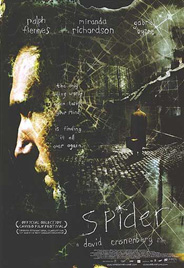Spider
| Spider is one of the least overtly Cronenbergian films of David Cronenberg's career—there are no twisted deformities, oozing placentas, fecal parasites, freaky gynecological tools, or loving close-ups of mangled flesh—yet it fits neatly into the director's career, making what had previously been physical psychological, resulting in one of his best films. Spider is a deeply moving portrait of the fragility of human sanity, leaving us with open-ended questions about the nature of truth and the unreliability of our own memories in shaping our past experiences. Adapted by Patrick McGrath from his highly praised first-person novel, Spider tells the story of Dennis Cleg (Ralph Fiennes), whose childhood nickname gives the film its title. Spider is a schizophrenic who is being released from a mental institution after 20 years. He is sent to a halfway house run by the domineering Mrs. Wilkinson (Lynn Redgrave), which is located, ironically, in the drab, industrial, working-class neighborhood in London where he grew up. This triggers the core of the film's narrative, which is the tracing of Spider's memories of his tormented childhood. Spider grew up with an often cold and abusive father (Gabriel Byrne) and a quietly suffering mother (Miranda Richardson). The threat of domestic violence runs its threads throughout Spider's childhood, and, after one particularly traumatic night, he finds that his father has replaced his mother with a cockney slut named Yvonne (Richardson again) who his father tries to convince him is his actual mother (the psychological damage inflicted on the young Spider by his father is more harrowing than any physical abuse). Spider's memories are made more immediate by his being in the middle of them. That is, as he remembers the scenes of his past, his adult self is standing right there, lingering in the doorway of the dining room as his mother and father eat in cold silence or sitting on a bench outside the small shack where his father commits his worst atrocities. It is a powerful visual means of signifying the interconnections between the past and present, how our memories of what happened (or didn't happen) in the past forever shape and determine our futures. The inescapability not of the actual historical past, but of our own mental creation of it, is one of the film's most striking themes. Whereas characters in most of Cronenberg's previous films were trapped in various ways by the corporeal, here Spider is a prisoner of his own mind. One of the least remarked aspects of Cronenberg's career is how he elicits such first-rate performances from his lead actors. Joining the tour-de-force performance by Jeremy Irons as obsessive twins in Dead Ringers (1988), Jeff Goldblum's harrowing turn as an scientist-gone-mad in The Fly (1986), Christopher Walken's ordinary man with extraordinary powers in The Dead Zone (1983), and James Woods's sleazy-sympathetic video producer in Videodrome (1983), Ralph Fiennes turns in a fantastic portrayal of a man whose mind is in flux, yet cannot express himself beyond inaudible mumbles. Stooped over and literally withdrawing himself into his dingy trenchcoat and layer upon layer of shirts, Fiennes's performance is almost entirely physical, conveying his character's inner torment in his external movements. However, as good as Fiennes is, the real stand-out here is Miranda Richardson, who is called upon to play two distinctly different characters (Spider's caring mother and his sluttish replacement), and also shows up at various times in unexpected places to convey Spider's inability to separate past and present, reality and nightmare. Visually, Spider reflects the grimness of its subject matter. The bleak, unchanging world of Spider's neighborhood is shot in hues of gray and desaturated color by cinematographer Peter Suschitsky, who has shot all of Cronenberg's films since Dead Ringers. The film almost has the feel of black and white, evoking everything from film noir to the kitchen sink dramas of the British New Cinema movement in the early 1960s. Cronenberg has often been accused of being too clinical in his films (something that he has admitted himself), but Spider touches an emotional core in a way that many of his other films have not. The result is a profoundly moving experience that, in a short running time, conveys visually and thematically the frail nature of the human mind and, by extension, humanity itself. Copyright © 2003 James Kendrick |
Overall Rating: 


 (4)
(4)


